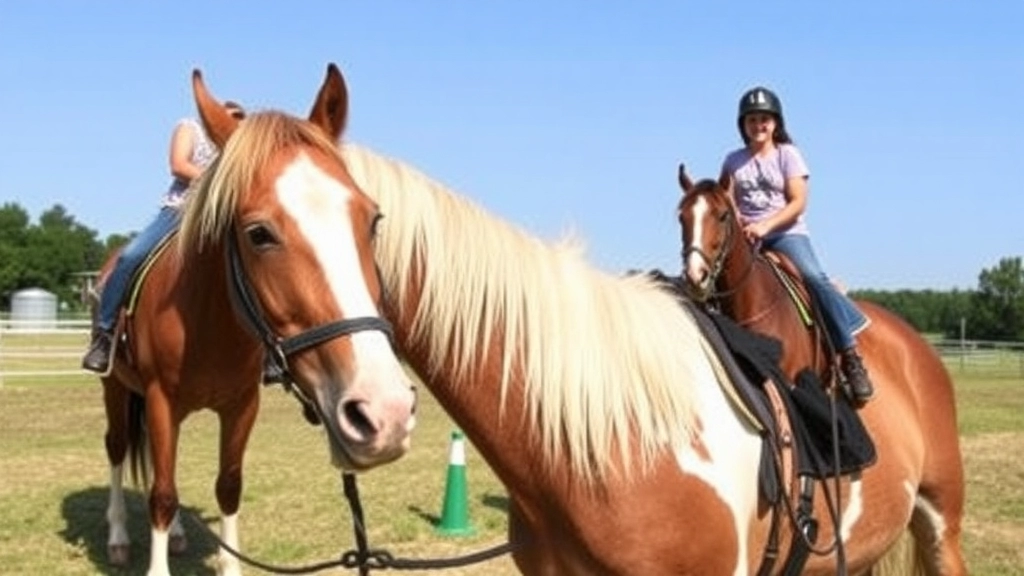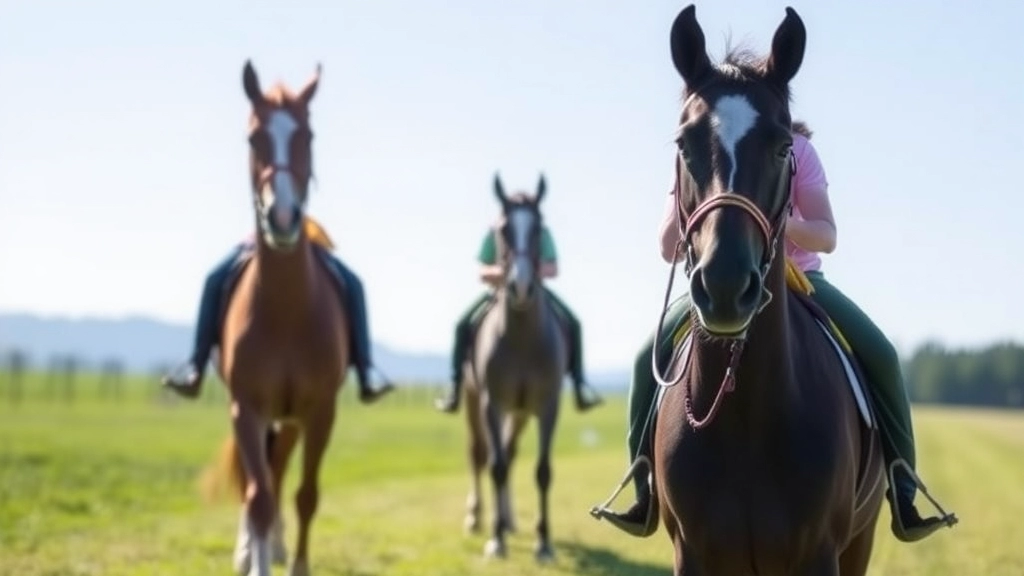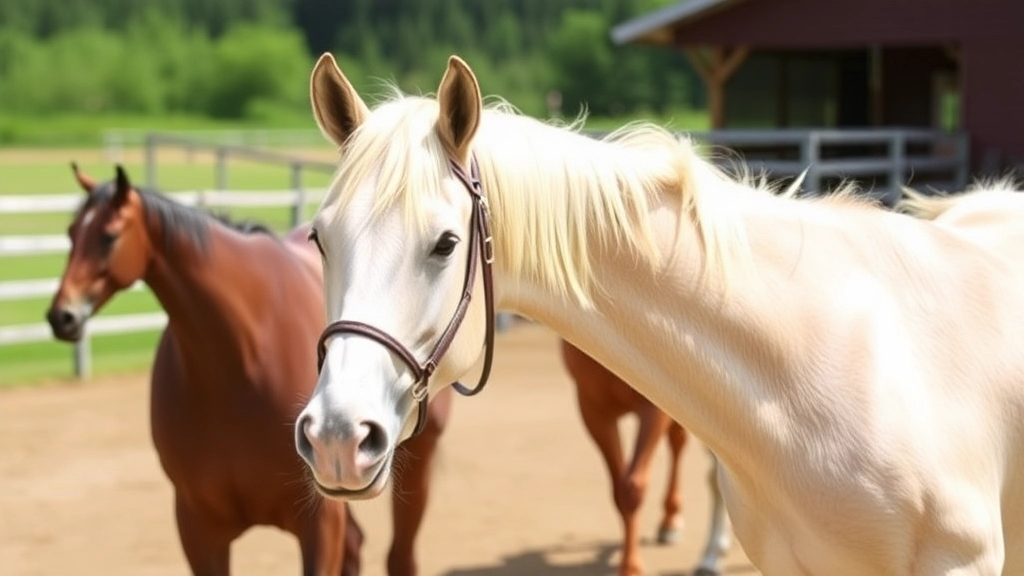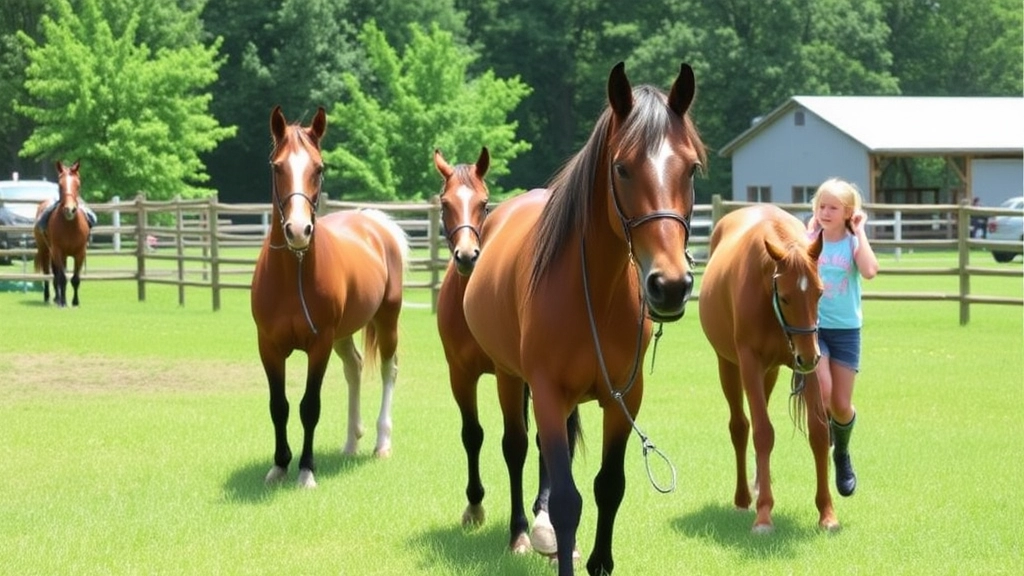Horse Summer Camps: An Unforgettable Experience
Are you or your child passionate about horses and looking for an unforgettable summer experience? Horse summer camps might just be the perfect adventure. This article will guide you through the various types of horse summer camps available, the incredible benefits they offer, and how to choose the right one. We’ll also cover essential packing tips, safety guidelines, and answer frequently asked questions to ensure you have a smooth and enjoyable camp experience.
Types of Horse Summer Camps
From traditional camps that provide a well-rounded horse experience to specialized camps focused on advanced riding techniques, there’s something for everyone. You’ll learn about the confidence-boosting and skill-building benefits of attending these camps, hear real testimonials from past campers, and get practical advice on everything from packing lists to safety tips.
Ready to Saddle Up?
Let’s dive in and explore the world of horse summer camps!
Types of Horse Summer Camps
Alright, let’s dive straight into it. What types of horse summer camps are out there? I get it, you’re probably wondering if there’s a camp that fits your specific needs or your kid’s wildest horse dreams. Trust me, there’s a camp for everyone, and I’m here to break it down for you.
Traditional Horse Camps
First up, traditional horse camps. These are your bread-and-butter camps where kids and teens get the full horse experience. Think daily riding lessons, horse care, and some good old-fashioned camp activities like swimming and crafts. Perfect for beginners and intermediate riders who want a rounded experience.
Specialised Riding Camps
Next, we have specialised riding camps. These camps are for those who eat, sleep, and breathe horses. They focus heavily on riding skills and techniques. Whether it’s dressage, show jumping, or cross-country, you’ll find a camp that hones in on specific disciplines. Ideal for those looking to compete or seriously up their riding game.
Adventure Horse Camps
Then there are adventure horse camps. Imagine combining your love for horses with thrilling outdoor activities. Think trail rides through breathtaking landscapes, overnight camping trips, and maybe even some horse swimming (yes, that’s a thing). These camps are perfect for the adventurous spirit who wants more than just arena time.
Therapeutic Riding Camps
Don’t overlook therapeutic riding camps. These camps cater to individuals with special needs, providing a supportive environment where they can experience the joy of riding. It’s not just about riding; it’s about building confidence, improving motor skills, and having a blast while doing it.
Family Horse Camps
Lastly, we’ve got family horse camps. These are for families who want to bond over their love for horses. You’ll find activities designed for all ages and skill levels, making it a fantastic way to spend quality time together.
Real Questions and Worries
Now, you might be asking, âWhich camp is right for me or my kid?â Or maybe, âIs it safe?â These are legit concerns, and we’ll tackle them head-on. Choosing the right camp can feel overwhelming, but knowing the types makes it easier to narrow down your options.
Key Takeaways
- Traditional Horse Camps: Great for a well-rounded experience.
- Specialised Riding Camps: Perfect for honing specific riding skills.
- Adventure Horse Camps: Ideal for thrill-seekers.
- Therapeutic Riding Camps: Supportive environment for special needs.
- Family Horse Camps: Bonding time for the whole family.
If you’re interested in other types of camps, you might want to check out the special needs summer camps or learn about top summer camps in Fayetteville, AR.
Benefits of Attending Horse Summer Camps

Ever wondered if horse summer camps are worth it?
Let’s break it down.
1. Building Confidence
You know that feeling when you nail something new? Like the first time you ride a horse on your own. It’s a confidence booster.
2. Learning Responsibility
Taking care of a horse isn’t just fun. It’s serious business. Feeding, grooming, and understanding their needs teach you responsibility.
3. Making New Friends
Horse camps are a social hub. You meet people who share your passion. Lifelong friendships often start here.
4. Physical Fitness
Riding a horse isn’t just sitting there. It’s a full-body workout. Balance, coordination, and core strength all get a boost.
5. Stress Relief
Ever felt the peace of a quiet ride through nature? It’s like therapy. Horses have a calming effect that helps reduce stress.
6. Skill Development
From basic riding to advanced techniques, you learn a ton. Not just about riding, but also about horse care and safety.
7. Fun and Adventure
Let’s not forget the fun part. Trail rides, obstacle courses, and horse shows. It’s an adventure every day.
8. Career Pathways
Thinking long-term? Horse summer camps can be a stepping stone to careers in veterinary science, equine therapy, or professional riding.
Real Stories
Take Sarah, for example. She started at a horse camp and now runs her own stable. Or Jack, who went from summer camper to competitive rider.
How to Choose the Right Horse Summer Camp
Alright, so you’re thinking about sending your kid to a horse summer camp. That’s awesome! But how do you pick the right one? Let’s dive into it.
Real Questions and Worries
First off, I get it. You’re worried about safety, the quality of instruction, and whether your child will actually enjoy it. These are legit concerns, so let’s address them head-on.
Key Factors to Consider
Camp Reputation:
- Reviews and Testimonials: Check out what other parents and campers are saying. Look for reviews online and ask for testimonials directly from the camp.
- Years in Operation: A camp that’s been around for a while is generally a good sign. It means they know what they’re doing and have a track record.
Safety Measures:
- Certified Instructors: Ensure the camp has qualified and certified riding instructors. This is non-negotiable.
- Emergency Protocols: Ask about their emergency procedures. Do they have medical staff on-site? How far is the nearest hospital?
Programme Offerings:
- Skill Levels: Make sure the camp caters to your child’s skill level, whether they’re a beginner or an advanced rider.
- Activities Beyond Riding: Look for camps that offer a variety of activities. Horse care, trail rides, and even some non-horsey activities can make the experience richer.
Camper-to-Staff Ratio:
- Personal Attention: A lower camper-to-staff ratio means more personalised attention for your child. This is crucial for both learning and safety.
Location and Facilities:
- Proximity: How far is the camp from home? This can be a big deal if you need to make a quick trip for any reason.
- Facilities: Check if the camp has well-maintained stables, arenas, and equipment. A tour (virtual or in-person) can be very telling.
Stories and Examples
I remember when I was picking a camp for my niece. We found one that had rave reviews but was a bit far. The deciding factor? They had a 24/7 on-site nurse and an excellent camper-to-staff ratio. That peace of mind was worth the extra drive.
Internal Linking Opportunities
If you’re still unsure, check out our section on safety tips for more detailed insights. And if you’re curious about what to pack, head over to our packing list.
What to Pack for Horse Summer Camp

Worried about forgetting something important for horse summer camp?
You’re not alone.
Packing can be a headache, but I’ve got you covered.
Here’s a no-nonsense list to make sure you’re ready to ride.
Essential Gear
First up, the basics.
Make sure you have:
- Riding Helmet: Safety first. Always.
- Riding Boots: Comfortable and sturdy.
- Jodhpurs or Riding Trousers: Trust me, they make a difference.
- Gloves: Protect your hands from blisters.
Clothing Essentials
You’ll need more than just riding gear.
Think about:
- T-shirts and Long Sleeves: For varying weather.
- Jackets: Lightweight and waterproof.
- Comfortable Trousers: For downtime.
- Swimwear: Some camps have pools or lakes.
Personal Items
Don’t forget the personal stuff.
Pack:
- Toiletries: Toothbrush, toothpaste, shampoo, you know the drill.
- Sunscreen: You’ll be outside a lot.
- Insect Repellent: Bugs can be a pain.
- Medications: Anything you need regularly.
Extras to Consider
A few extras can make your camp experience even better.
Think about:
- Notebook and Pen: Jot down tips and memories.
- Camera: Capture those special moments.
- Snacks: For when you need a quick bite.
Stories from the Saddle
I remember my first camp.
I forgot my gloves.
Blisters for days.
Lesson learned.
Pack those gloves!
Safety Tips for Horse Summer Camps
So, you’re excited about heading to a horse summer camp, but you’ve got some worries, right? Maybe you’re thinking, âWhat if I get hurt?â or âHow do I stay safe around these massive animals?â Don’t sweat it. Let’s break it down and make sure you have a blast while staying safe.
Basic Safety Tips for Horse Summer Camps
1. Know Your Horse
First things first, get to know your horse. Horses have personalities just like us. Some are chill, others can be a bit jumpy. Spend some time with your horse before mounting up. This helps you understand their quirks and builds trust.
2. Wear Proper Gear
This one’s a no-brainer, but you’d be surprised how many people overlook it. Always wear a helmet. It’s non-negotiable. Also, invest in some good riding boots with a small heel to prevent your feet from slipping through the stirrups.
3. Stay Alert
Horses are unpredictable. They can spook at the smallest thingsâa sudden movement, a loud noise, you name it. Always stay alert and be aware of your surroundings. Keep an eye on your horse’s body language for any signs of distress.
4. Follow the Rules
Every camp has its own set of rules. They’re not there to cramp your style; they’re there to keep you safe. Whether it’s about how to approach a horse or where you can ride, stick to the guidelines.
5. Communicate
If you’re unsure about something, ask. Whether it’s your instructor, a fellow camper, or even a seasoned rider, never hesitate to seek advice. Communication is key to preventing accidents.
Advanced Safety Tips for Horse Summer Camps
1. Emergency Procedures
Know the emergency procedures of your camp. Familiarise yourself with the location of first aid kits, emergency exits, and who to contact in case of an emergency.
2. Handling Equipment
Properly handling and storing equipment is crucial. Always check your tack before riding. Look for any signs of wear and tear. A broken strap or loose stirrup can lead to accidents.
3. Horse Health Checks
A healthy horse is a safe horse. Learn the basics of horse health checks. Look out for signs of discomfort or illness, such as limping, unusual sweating, or changes in behaviour.
4. Practice Good Hygiene
Horse camps can be a breeding ground for germs. Wash your hands regularly, especially after handling horses or equipment. Keep your gear clean to prevent infections.
5. Stay Hydrated
Riding can be physically demanding. Make sure you’re drinking plenty of water throughout the day. Dehydration can make you dizzy and less alert, increasing the risk of accidents.
Common Concerns and How to Address Them
âWhat if I fall off?â
Falling off a horse is a common fear. Here’s the deal: it happens to the best of us. The key is to learn how to fall safely. Tuck and roll to avoid serious injury. And always get back on the horseâliterally and figuratively.
âWhat if the horse gets spooked?â
If your horse gets spooked, stay calm. Horses sense our emotions. If you panic, they panic. Keep a firm grip on the reins and try to steer the horse away from whatever is causing the fear.
âWhat if I get lost on a trail ride?â
Stick with your group and always follow the trail markers. If you do get separated, stay put and wait for help. Most camps have protocols for dealing with lost riders.
For more information on how to ensure a safe and enjoyable camp experience, check out our guide to summer camp activities. And if you’re looking for tips on how to stay cool during those hot camp days, don’t miss our top tips for keeping cool.
Frequently Asked Questions About Horse Summer Camps

Alright, let’s get straight to it.
You’re probably wondering about horse summer camps.
So, let’s answer some of the most common questions.
What age is appropriate for horse summer camps?
Most camps start accepting kids from age 7 and up. Some even have programs for teens and adults.
Do I need previous riding experience?
Nope. Many camps cater to all skill levels, from total beginners to advanced riders.
What kind of activities are included?
It’s not just riding. You’ll find:
- Horse care and grooming
- Stable management
- Trail rides
- Horseback games
- Even some arts and crafts
How safe are horse summer camps?
Safety is a big deal. Camps usually have trained staff, safety protocols, and proper gear. Always check if the camp is accredited by a reputable organization.
What should I pack?
Think basics:
- Riding boots
- Helmet
- Comfortable clothes
- Sunscreen
- Water bottle
How much does it cost?
It varies. You might find camps ranging from £200 to £1000 per week. Always check what’s included in the price.
Can I bring my own horse?
Some camps allow it, but most provide horses. Check with the camp beforehand.
What if I have allergies?
Talk to the camp staff. They usually have measures for common allergies, but it’s good to be prepared.
Are there any weight limits for riders?
Yes, many camps have weight limits for safety reasons. Check the camp’s policy ahead of time.
How do I choose the right camp?
Look for:
- Good reviews
- Qualified staff
- A focus on safety
- Activities that match your interests
Can parents visit or stay?
Some camps have visiting days or family weekends. Others are strictly for campers only.
What if my child gets homesick?
Camp staff are trained to handle homesickness. They’ll keep your child engaged and supported.
Do camps accommodate special needs?
Many do. Always discuss your child’s needs with the camp beforehand.
What’s the food like?
Most camps offer balanced meals. If you have dietary restrictions, let the camp know in advance.
Is there a refund policy?
Check the camp’s terms and conditions. Some offer refunds, others might not.
What’s the best time to book?
Early bird gets the worm. Book at least a few months in advance to secure a spot.
How long do camps last?
Camps can last from a few days to several weeks. Pick what works best for your schedule.
Are there overnight options?
Yes, many camps offer overnight stays. Some even have weekend or week-long options.
How do I stay in touch with my child?
Most camps allow phone calls or emails. Check their communication policy.
What if my child doesn’t like it?
Give it time. Most kids warm up after the first day or two. If it’s still an issue, talk to the camp staff.
There you have it. Got more questions? Feel free to ask. Choosing the right horse summer camp can be a game-changer.
Testimonials and Experiences from Past Campers
Ever wondered what it’s really like to attend a horse summer camp?
You’re not alone. Loads of people have the same question.
Let’s dive into some real stories from past campers. These testimonials will give you the lowdown on what to expect.
“Changed My Life” – Jess, 14
Jess attended a horse summer camp last year.
She was nervous at first.
Who wouldn’t be?
But by the end of the week, she didn’t want to leave.
Jess says:
- Confidence Boost: “I was super shy before camp. But working with the horses made me more confident.”
- New Skills: “I learned how to groom and saddle a horse. Plus, I can now ride like a pro!”
- Friendships: “I made friends for life. We still chat every week.”
“Best Summer Ever” – Tom, 16
Tom’s story is another great example.
He was more into video games than outdoor activities.
But his parents signed him up anyway.
Here’s what Tom had to say:
- Physical Activity: “I got off the couch and got moving. Riding is a workout!”
- Teamwork: “Working with the horses and other campers taught me the value of teamwork.”
- Memories: “I have so many great memories. The campfires, the trail rides, everything.”
“A Family Tradition” – The Smiths
The Smith family has been sending their kids to the same horse camp for years.
Here’s why:
- Consistency: “Every year, the camp gets better. They keep the same high standards.”
- Safety: “We never worry about our kids’ safety. The staff is top-notch.”
- Growth: “Our kids come back more mature and responsible.”
Why These Stories Matter
These testimonials aren’t just fluff.
They show the real impact a horse summer camp can have.
From boosting confidence to making lifelong friends, the benefits are clear.
And it’s not just about the kids.
Parents see the value too.
Ready to Experience It Yourself?
If these stories have got you excited, you’re not alone.
Horse summer camps offer something special.
Whether you’re looking to build confidence, learn new skills, or just have the best summer ever, there’s a camp out there for you. For more information on various camps, check out the complete guide to summer camps and explore the creative themes available for an unforgettable experience.
Frequently Asked Questions About Horse Summer Camps
Alright, let’s get straight to it.
You’re probably wondering about horse summer camps.
So, let’s answer some of the most common questions.
What age is appropriate for horse summer camps?
Most camps start accepting kids from age 7 and up. Some even have programs for teens and adults.
Do I need previous riding experience?
Nope. Many camps cater to all skill levels, from total beginners to advanced riders.
What kind of activities are included?
It’s not just riding. You’ll find:
- Horse care and grooming
- Stable management
- Trail rides
- Horseback games
- Even some arts and crafts
How safe are horse summer camps?
Safety is a big deal. Camps usually have trained staff, safety protocols, and proper gear. Always check if the camp is accredited by a reputable organization.
What should I pack?
Think basics:
- Riding boots
- Helmet
- Comfortable clothes
- Sunscreen
- Water bottle
How much does it cost?
It varies. You might find camps ranging from £200 to £1000 per week. Always check what’s included in the price.
Can I bring my own horse?
Some camps allow it, but most provide horses. Check with the camp beforehand.
What if I have allergies?
Talk to the camp staff. They usually have measures for common allergies, but it’s good to be prepared.
Are there any weight limits for riders?
Yes, many camps have weight limits for safety reasons. Check the camp’s policy ahead of time.
How do I choose the right camp?
Look for:
- Good reviews
- Qualified staff
- A focus on safety
- Activities that match your interests
Can parents visit or stay?
Some camps have visiting days or family weekends. Others are strictly for campers only.
What if my child gets homesick?
Camp staff are trained to handle homesickness. They’ll keep your child engaged and supported.
Do camps accommodate special needs?
Many do. Always discuss your child’s needs with the camp beforehand.
What’s the food like?
Most camps offer balanced meals. If you have dietary restrictions, let the camp know in advance.
Is there a refund policy?
Check the camp’s terms and conditions. Some offer refunds, others might not.
What’s the best time to book?
Early bird gets the worm. Book at least a few months in advance to secure a spot.
How long do camps last?
Camps can last from a few days to several weeks. Pick what works best for your schedule.
Are there overnight options?
Yes, many camps offer overnight stays. Some even have weekend or week-long options.
How do I stay in touch with my child?
Most camps allow phone calls or emails. Check their communication policy.
What if my child doesn’t like it?
Give it time. Most kids warm up after the first day or two. If it’s still an issue, talk to the camp staff.
There you have it. Got more questions? Feel free to ask. Choosing the right horse summer camp can be a game-changer.

